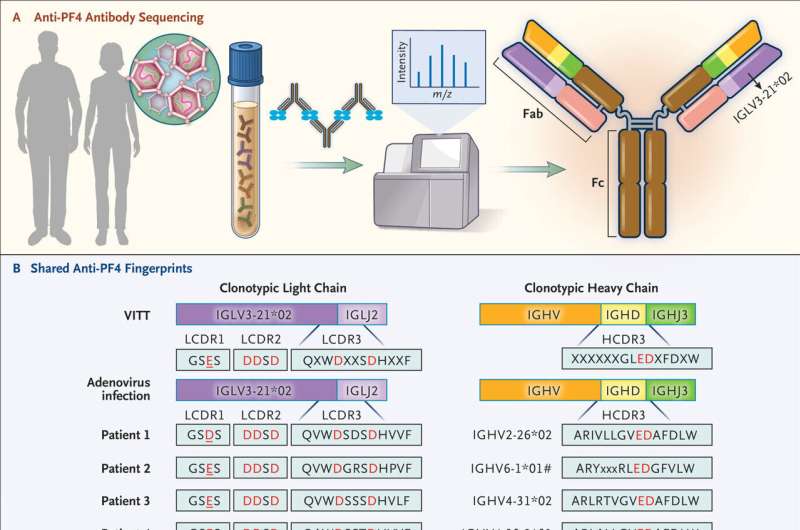This article has been reviewed according to Science X's editorial process and policies. Editors have highlighted the following attributes while ensuring the content's credibility:
fact-checked
peer-reviewed publication
trusted source
proofread
Link between COVID-19 vaccine complication and rare 'common cold' blood disease

New research led by Flinders University and international experts is expanding understanding of vaccine-induced immune thrombocytopenia and thrombosis (known as VITT).
At the height of the COVID-19 pandemic in 2021, VITT emerged as a new disease following adenovirus vector-based vaccines—notably the Oxford-AstraZeneca vaccine.
VITT was found to be caused by an unusually dangerous blood autoantibody directed against a protein termed platelet factor 4 (or PF4).
In separate research in 2023, researchers from Canada, North America, Germany and Italy described a virtually identical disorder with the same PF4 antibody that was fatal in some cases after natural adenovirus (common cold) infection.
Flinders University researchers Dr. Jing Jing Wang and Flinders Professor Tom Gordon, Head of Immunology at SA Pathology in South Australia, led a previous study in 2022 which cracked the molecular code of the PF4 antibody and identified a genetic risk factor related to an antibody gene termed IGLV3.21*02.
Now, the Flinders group has collaborated with this international group of researchers to find that the PF4 antibodies in both adenovirus infection-associated VITT and classic adenoviral vectored VITT share identical molecular fingerprints or signatures.
The research will also have implications for improving vaccine development, says Flinders University researcher Dr. Wang, first author on the article published in the New England Journal of Medicine and titled "Antibody Fingerprints Linking Adenoviral Anti-PF4 Disorders."
"These findings, using a completely new approach for targeting blood antibodies developed at Flinders University, indicate a common triggering factor on virus and vaccine structures that initiates the pathological pF4 antibodies," explains Professor Gordon.
"Indeed, the pathways of lethal antibody production in these disorders must be virtually identical and have similar genetic risk factors.
"Our findings have the important clinical implication that lessons learned from VITT are applicable to rare cases of blood clotting after adenovirus (a common cold) infections, as well as having implications for vaccine development," he says.
More information: Jing Jing Wang et al, Antibody Fingerprints Linking Adenoviral Anti-PF4 Disorders, New England Journal of Medicine (2024). DOI: 10.1056/NEJMc2402592



















